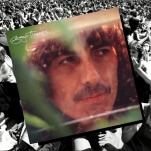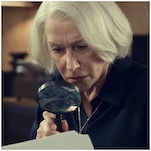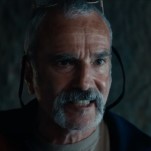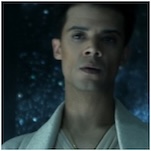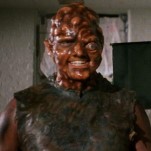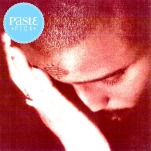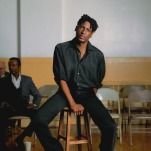When Words Fail: Phil Elverum Navigates Life After Death
Photo by Genevieve Elverum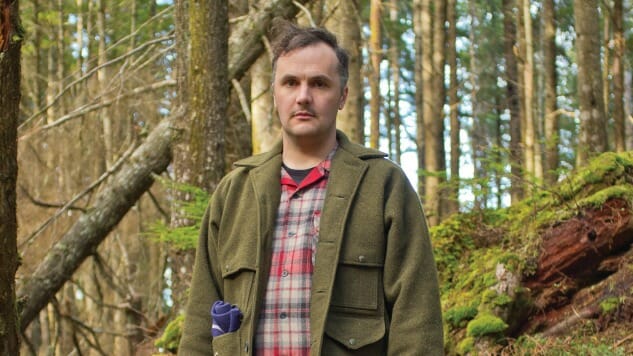
“Death is real.” It’s a phrase Phil Elverum, who performs under the name Mount Eerie (and, earlier, The Microphones) scatters like ashes throughout his gripping new album, A Crow Looked at Me. These words do not exist for superficial shock value; death is something Elverum has dealt with firsthand, and he lives with its aftermath every day.
Elverum’s wife, artist and illustrator Geneviève Castrée, died nine months ago after a brief and painful battle with pancreatic cancer. The stage-four diagnosis came suddenly, just four months after the birth of the couple’s baby daughter, with Castrée, who was experiencing mild abdominal pain at the time, visiting the doctor for a routine postpartum checkup. Elverum eventually launched a GoFundMe campaign last June to help with medical bills, but Castrée succumbed to her disease only weeks later. “It’s all very sad and surreal. So much is left unfinished for her. She was a firehose of brilliant ideas that never turned off. We loved her and everything is weird now,” her husband wrote at the time.
Grappling with the unspeakable loss, Elverum sat down in his wife’s studio, where he wrote and recorded A Crow Looked At Me. It’s an 11-song window into his despair and bewilderment, made plain from the start on opener “Real Death,” which states for the record that ”[death is] not for singing about” nor “for making into art.” Even with that stark admission, Elverum continues to process his pain against spare acoustic arrangement.
Crow articulates more than just a one-sided sadness. Traveling through an entire spectrum of bereavement, Elverum is mystified at how someone can exist and then be irrevocably gone; he refuses to associate Castrée’s ashes with her personhood, instead choosing to think of her when he sees the sunset. He wonders if a pair of ravens he saw in 2015 portended Castrée’s death. He hunts for meaning in such seemingly insignificant encounters prior to and after her departure but, ultimately, finds none. All he can do, in response to this profoundly devastating thing, is continue to exist and write what he knows.
Below, Elverum speaks to Paste over the phone about losing Castrée, talking to his daughter about her mother and why he can no longer stand to be “the hub of sorrow.”
Paste: I was deeply moved by Jayson Greene’s profile of you in Pitchfork. He doesn’t mention his personal tragedy, but I’m guessing you were aware of it before you met?
Phil Elverum: I read his story before. I knew who he was ‘cause he worked at Pitchfork and reviewed some of my records. I have a publicist, you know. He pointed out Jayson’s New York Times op-ed piece about his daughter dying. He told me, “I’m seeing if Jayson Greene will write about your record, Phil. I don’t know if he’s the perfect person or the least perfect person.” And I didn’t either. I mean, this record is so unique. We had a lot of discussions about how to even talk about it. Or at what angle to take with … Advertising it, really. So it turned out that Jayson was the perfect person, and we really bonded. We’re friends now.
Paste: This is a very different record. At the risk of asking you anything that you’ve already been asked, I was struck by its opener where you make a point of separating art and death. How do you reconcile the fact that death, in the end, has been processed in the form of art? Do you feel the need to reconcile it?
Elverum: I think it was like a thesis. [Laughs.] I still actually don’t feel like I expressed it totally. The difference between [art’s idea of] death and real death. The difference between the idea of a thing and then like actually being in it. And how wrong it is to use art. And music and poetry can sometimes be a mask or a blur on top of reality. Even now, I’m having a hard time articulating this thing.
It’s ambitious to even open my mouth about it. But yeah, it’s not for making into art. That’s why I say it’s not for singing about. This thing had happened to me. This impulse that I felt in myself to be like, “What will I say to the world about this? What will I make out of this?” And then immediately feeling like that was so gross. Just that prospect at all was impossible. Like, why would I? How could I convey this? How could I convey the reality of it? Once you’re talking about it, the mirrored-echoed version of the thing perverts it, or something.
I mean, it is weird. ‘Cause part of the work that I’m doing these days [is] getting ready for tours, stuffing records, shipping out orders, getting the merch together. It’s like, the capitalist. [Laughs.] Capitalism is part of the realities of the other part of my job, which is releasing records. So that’s weird to factor in. I am commodifying my grief, to put it really bluntly.
I accept it. And I try not to think about it. [Laughs.] There’s a conflict there. Is it okay? Is it okay for me to be doing well because of this tragic record? Is it okay for me to like have a smile on my face ‘cause people are saying nice things to me? What does it all mean?
Paste: Well, artists create what they know, to use the old adage. And also, you did create a very stunning record that expresses a feeling in a voice that only you possess. If that offers you any solace.
Elverum: I think you’re right. I mean, I think that’s true. I just can’t turn off the part me that asks that question over and over.
-

-

-

-

-

-

-

-

-

-

-

-

-

-

-

-

-

-

-

-

-

-

-

-

-

-

-

-

-

-

-

-

-

-

-

-

-

-

-

-

